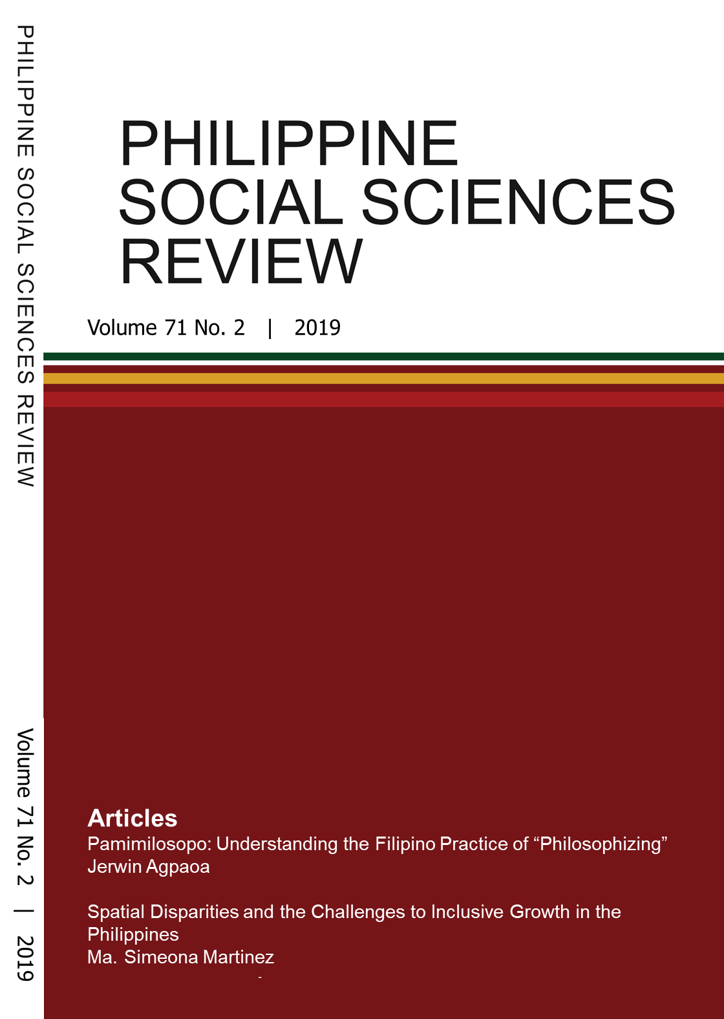PSSR Editor’s Notes
Abstract
This issue of the Philippine Social Sciences Review (PSSR) contains interesting pieces from the disciplines of Philosophy and Geography.Philosophy is a subject thought to be the exclusive domain of the serious-minded few. Yet Jerwin Agpaoa, from the Department of Philosophy, in Pamimilosopo: Understanding the Filipino Practice of “Philosophizing” offers a light, (at times humorous) but deeply insightful take on the act of philosophizing in the popular discourse. Agpaoa looks into how the act of pamimilosopo is usually frowned upon in the Philippine context. In the popular mindset the term implies excessive critical thinking and unreasonable scrutiny – perversions of true philosophy. Pamimilosopo is often linked to playing with the meanings of words and seen in a negative light.
A philosopher is one who inquires into the nature of things and concepts. But Agpaoa’s work is not so much an exploration into the philosophical discourse on the philosophical analysis of language, communication, and semiotics. Language conveys messages. However, speeches are not merely literal or textual utterances. They can be modified by the speaker and received by the listener (whether intentionally or unintentionally) and which can lead to misunderstandings and even irritation and annoyance on the part of the recipient. Agpaoa cites the problem that arises from such indirect speech acts that are not deciphered when uttered. In the process, “philosophizing” is carried to ridiculous extents.
Agpaoa uses and cleverly dissects everyday utterances and instances to illustrate how everyday concepts such as “unlimited” and “forever” can be used without qualification and therefore render it open to misinterpretation. Ultimately, the article seems to beg the question – why do people engage in pamimilosopo in the first place? Agpaoa offers some illumination on the intention but, again, such elucidations are also subject to pamimilosopo.
Far from simply being a subject of “earthers”, Ma. Simeona Martinez from the Department of Geography in Spatial Disparities and the Challenges to Inclusive Growth in the Philippines looks at economic integration and inclusive growth from a spatial or geographical perspective.
While the Philippines has seen marked absolute growth rates over the last decade, the country remains unsuccessful in addressing income inequality and poverty in many places and spaces despite its “inclusive growth” strategy evident in its development plans. Disparities in income, living standards, and socio-economic opportunities between urban and rural areas continue to be evident. Taking off from the findings and observation from the available literature, Martinez observes that economic resources and work opportunities continue to be concentrated in highly urbanized areas, most notably the National Capital Region and its adjacent areas while those in the South – the Autonomous Region in Muslim Mindanao and its environs continue to be low-growth areas. She likewise observes the persistent and disproportionate marginalization from the benefits of economic growth of the agriculture, forestry, and fishing (AFF) sector composed of farm workers and fisherfolk as well as indigenous peoples in rural areas.
Martinez points out development policies that seek to promote inclusive growth have fallen short of their stated goals and targets especially for the sectors she cites. In effect, the more growth occurs (in the urban centers), the more marginalized those in the rural sectors unless gaps in social services and development opportunities are effectively addressed. These persistent disparities will ultimately act as fetters to genuine and inclusive growth.
In order to address these lingering disparities, Martinez suggest schemes to facilitate the creation of incentives for rural peoples to develop local resources and the appropriate human capital to counter the tendency of the labor force to migration to the urban areas. Government needs to provide the necessary human capital investments and support for local production that can facilitate a healthier link between rural and urban areas.
PSSR will continue to offer interesting and insightful social science takes on issues and questions that impact on the Philippines and other developing areas. PSSR publishes original papers from various fields in the social sciences and philosophy and encourages contributions from young researchers and educators in the social sciences from different institutions. In addition to original research papers, the journal also publishes book reviews, research notes, and articles on thematic issues.
Published
2021-11-15
How to Cite
TIGNO, Jorge V..
PSSR Editor’s Notes.
Philippine Social Sciences Review, [S.l.], nov. 2021.
ISSN 2672-3158.
Available at: <https://journals.upd.edu.ph/index.php/pssr/article/view/8408>. Date accessed: 22 sep. 2025.
Section
Editor's Note


